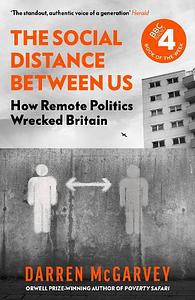Take a photo of a barcode or cover
adventurous
challenging
informative
reflective
fast-paced
BBC Radio 4 Book of the Week. Apart from collecting all the information in one place, I’m afraid most of it has been heard before.
If ever a book deserved the comment 'thought-provoking' it would be this one. Really well researched and written, I'm keen to seek out some of McGarvey's TV programmes as a result.
This book will radicalise you - change is necessary and possible.
It's original, harrowing, beautifully written, very well argued, and extremely quotable. The thesis is clear and clever, and there's a big range of sources - lived experience, reportage, academic, current affairs, et al. He's very honest about himself, and aware of his legitimacy to tell some stories given the partial, though importantly relevant, experiences he's been through.
His other book and Reith Lectures were brilliant, and this is indispensable
It's original, harrowing, beautifully written, very well argued, and extremely quotable. The thesis is clear and clever, and there's a big range of sources - lived experience, reportage, academic, current affairs, et al. He's very honest about himself, and aware of his legitimacy to tell some stories given the partial, though importantly relevant, experiences he's been through.
His other book and Reith Lectures were brilliant, and this is indispensable
emotional
hopeful
informative
inspiring
reflective
sad
medium-paced
informative
slow-paced
challenging
informative
reflective
medium-paced
"Ultimately, how do we reconcile the basic principle of representative democracy - where leaders are elected by popular vote - with the fact that most who ascend to high office are unrepresentative of most Britons?"
The Social Distance Between Us: How Remote Politics Wrecked Britain is an indictment of the economic and social distance between the working class and the decision-makers of British politics. It is an exploration of how this produces political action which fails the most vulnerable in society.
McGarvey's book contains two acts. The first contains chapters discussing education, land ownership, housing, healthcare, and welfare. Throughout these chapters he dissects the responsibility the state bares for the proliferation of deprivation as a result of its mishandling of these crucial systems.
"At what point do we look for the root of Britain's problems not in the lifestyle choices, attitudes and behaviours of working people, and the poor and the vulnerable, but in the groundless assumptions, false beliefs and prejudices of the apparently educated, cultured and sophisticated?"
Throughout these chapters McGarvey introduces us to a number of individuals whose reality of life in Britain, where everyday is a struggle to meet the most basic of needs (food, housing, safety), lies in stark contrast to the lives of the political class they live at the mercy of.
McGarvey's tender handling of his vulnerable interview subjects is commendable. In fact, you sense McGarvey's personal experience with poverty, homelessness and addiction provoke a different conversation than we are familiar with seeing in print. These passages are the most compelling section of the book and McGarvey uses these accounts to drill home the gravity of the decision-making happening within the exclusive halls of Westminster.
"And there we were, in the same room, in the same city, both hailing from the same country, yet seperated by a vast cultural ravine."
From here on out the book is rather hit-or-miss for me. In the second act, McGarvey criticises the responses of conservatism, leftism and Blairism to deprivation. Where the chapters on Conservatism and Blairist paternalism were damning in all the ways I expected, I found myself pleasantly surprised by the reflections he shared on Leftism:
"The Left is so preoccupied with radically transforming society that it has neglected to consider the possibility of radically reforming itself."
However, this section of the book muddies itself with sweeping generalisations across these groups I see as containing multiple, separate entities. Further to that, the discussion of identity politics and even moreso Populism feels shallow and underdeveloped. While there is likely a worthwhile and convincing argument to follow this train of thought, McGarvey stops shy of developing it.
In the close of the book, McGarvey offers his insight on fixing the mess we find ourselves in. He remarks on finding himself in a strange in-between position now with more in common with the middle-class he rubs shoulders with but feeling as much an uninvited visitor as ever.
Some time has passed since I originally picked this book up. I distinctly remember the reactions and phrasings used that persuaded me towards it: "eye-opening", "angering" and again and again, "an uncomfortable read." It wasn't until I was a decent way into the book that I realised for the first time perhaps I am not its intended audience. Afterall, anyone familiar with the realities of working-class living could not possibly be shocked by the accounts, the statistics or the studies cited within its covers.
In my time at university I interacted with a number of international students who remarked on the British obsession with class. I was never able to truly concile with this as so much of the conversation I experienced on class in modern Britain was concealed behind a veneer of British politeness. Class is rarely addressed directly by the middle-class who struggle to self-reflect on its implications and even the extremely well-off I came across were reluctant to identify as such.
This book is an excellent balm to this excrutiating complacency. However, at it's core, it is a challenge, a provocation of the overgrown British middle-class to recognise itself as a propagator of the social ills it attributes to the people it hurts the most.
challenging
emotional
informative
reflective
slow-paced
challenging
informative
reflective
slow-paced
challenging
emotional
funny
hopeful
informative
reflective
sad
slow-paced



